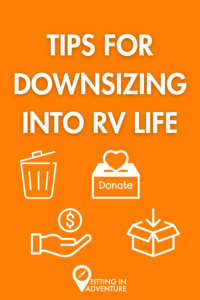Preparing to hit the road full-time is an incredible rush of excitement and a gut-sinking “oh crap, where do I even begin” feeling. The average American house is just over 2,000 square feet and you will likely hover around 200 square feet for an RV, maybe less, maybe more. So, how do you prepare yourself for an RV/tiny home living?
Give yourself as much time as possible. Although we planned our RV lifestyle for about two years, we began the downsizing about six months prior to hitting the road.
Here are a few of our tips:
Disclosure: Some links on our site are affiliate links. If you purchase a linked item, we will make a commission, at no extra charge to you.
- Begin with stages. The first time you go through a room will not be the last. Do not start packing your “keep” boxes just yet.
- Begin with your least used rooms. Guest rooms, closets, office, etc.
- Make four piles for each area.
- Trash – Get it out ASAP
- Charity – Take it to the charity ASAP
- Sell – Begin listing or garage sale as soon as you can. It will help you to have time and not feel forced to settle for lower prices.
- Keep a spreadsheet of boxes and what is in them. We labeled boxes with a vague description of the room or type of items and a box number. We kept a spreadsheet of everything in the box. This was specifically helpful while the things were in storage. If we needed to access something we were not trying to remember which box held the item. The spreadsheet had all the answers. In the event of theft or damage, it would also be helpful for insurance. A similar product exists on Amazon, but I used a numbering system and spreadsheet for free.
- Take a couple of trips with everything you THINK you need. You will find many more useless items. You may want to head to a truck stop with a CAT scale to ensure you are still below your GVWR, as well.
Mistakes we made:
- We kept too many organizational items. We thought everywhere needs organizing items, but they were bulky in storage and our new home base had closet organization when we purchased it.
- In hindsight, I would have started a full year out. It is a lot of work and a long process. The more time, the better.


While your own “essentials” list will vary from nearly every other RVer, here is a list of items we find essential in our rig.
- A good camera (or two or three). Whether you plan to document your trip officially on a site like this, YouTube, Instagram, or even just share via text message with family and friends. A camera will be necessary as you visit the amazing sites. We carry two Sony A7iii cameras, a Sony ZV-1, and a GoPro. We dedicate a fair amount of storage to our love of photos and video.
- Cooking in an RV is well different. Dreams of constant grilling are undoubtedly dancing in your head, but realistically you’re unlikely to feel like standing outside in the weather some evenings. The RV ovens are notoriously bad and stovetops are known for constant false smoke alarms. We have found Instant Pot cooking to be easy, but we are unlikely to keep the Instant Pot as we downsize to an even smaller rig. We will be keeping the air fryer and waffle maker though. Both offer the quickest and easiest lazy day meals on the go. We use the ceramic waffle maker to make chaffles. Chaffles are a combination of cheese and eggs typically, however, we add some bacon bits and peppers to make a quick protein breakfast.
- While sitting in front of a screen on the road is never the plan, you will have rainouts and rest days. We use Apple TV to keep our on-the-road and home streaming connected. If you’re an avid reader, you will want to get used to an e-reader if you have yet to embrace one.
- Your wardrobe will change as well. We both switched to simple clothing in a capsule wardrobe while opting for clothes that will layer for different climates.
- While trip planning is an entire process on its own, there are a few memberships we keep to enable easier planning. RV Trip Wizard is a part of RVLife and allows you to plan your RV-friendly routes, keep booking information and find campsites. Harvest Host is a connection app for breweries, distilleries, golf courses, and any other business giving you access to their parking lot for the night. It is unlikely you will have any hookups so plan accordingly. It is customary that you drop in for tastings etc while you stay overnight to “pay” for the otherwise free accommodations.
- Scan your important documents and keep anything you are taking with you in a fireproof packet.
Disclosure: Some links on our site are affiliate links. If you purchase a linked item, we will make a commission, at no extra charge to you.

